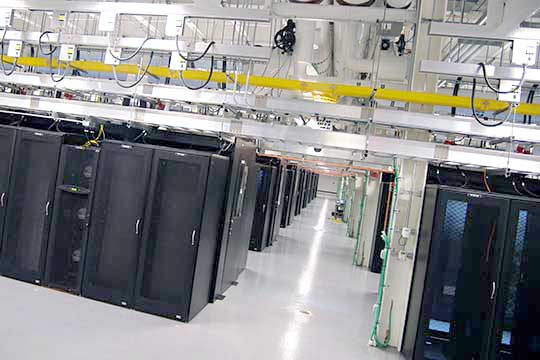
Project Represents $5 Million Investment by MIT, Harvard, BU, Northeastern, and UMass
Read the MGHPCC Press Release
Holyoke, Massachusetts, [September 7, 2022] – Reflecting ever-growing demand for computing power that has become fundamental to academic research, the Massachusetts Institute of Technology (MIT), Harvard University, Boston University, Northeastern University, and the University of Massachusetts announced today that they are investing more than $5 million to expand capacity at the Massachusetts Green High-Performance Computing Center (MGHPCC) in Holyoke, Massachusetts.
The expansion includes data center capacity to support several thousand new servers at the 90,000-square-foot facility, while employing local electrical and mechanical contractors and engaging in next-generation workforce development to support future research computing operations. The expansion is being driven by the planned and steady growth in computational research, as envisioned in the creation of the MGHPCC in 2009.
The computing infrastructure being added through the expansion is almost entirely powered by non–fossil fuel energy sources, including approximately 67 megawatts of local hydroelectric and solar generation operated by Holyoke Gas and Electric.
“Researchers rely on MGHPCC computing power to investigate how stars form, improve medical imaging, study ecosystem dynamics in New England coastal waters, and model the global risks of accelerating climate change, among many other impactful projects,” said MIT Vice President for Research Maria T. Zuber, a member of the MGHPCC Board of Directors. “Expanding the computing capacity at MGHPCC meets growing demand while heeding the imperative to perform this energy-intensive research with minimal environmental impact.”
Nearly every branch of science and engineering today relies on high-performance computing. “In silico” experimentation and data analytics have become powerful tools for knowledge discovery, alongside theory, physical experimentation and observation. In addition, machine learning has developed rapidly in recent years, expanding as both a research area and a tool for scientific discovery and innovation. As a result, MGHPCC members are now taking advantage of the expansion options that were built into the original facility design.
“That so much science now relies on intensive computation is testament to the vision of our founding institutions and public and private partners who came together to create the MGHPCC more than a decade ago,” said John Goodhue, Executive Director of the MGHPCC. “Their vision also correctly anticipated that research enabled by the MGHPCC would become foundational to the state’s innovation-based economy. The expansion helps maintain that position of strength and will allow us to further expand our horizons.”